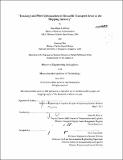Tracking and fleet optimization of Reusable Transport Items in the shipping industry
Author(s)
Lefebvre, Jean-Marie, M. Eng. Massachusetts Institute of Technology; Yue, Dameng
DownloadFull printable version (17.24Mb)
Other Contributors
Massachusetts Institute of Technology. Engineering Systems Division.
Advisor
James B. Rice, Jr.
Terms of use
Metadata
Show full item recordAbstract
This thesis explores the strategies, methodologies and tools for an optimal management of Reusable Transport Items, such as containers or chassis, in an extensive multi-depots network. We use an ocean shipping company operating globally to propose a broad, comprehensive and integrated system for an optimal management of the fleet, embracing technology, processes and monitoring system. The ability to track these assets is the first step to visibility and fleet optimization and we will question the opportunity for a company to invest in a real time tracking technology. In highly complex logistic networks, the challenge is to get the right equipment at the right place at the right time, in a cost efficient manner and with a fleet size as small as possible. Beyond increased visibility through tracking capabilities, we show that choosing an appropriate utilization metrics helps identify and quantify other areas of improvement. Using actual data, we evaluate to what extent the fleet size can be reduced by improving asset utilization and how leasing also impacts operating costs. We also show how the structural imbalance of trade (some regions being net exporters while others are net importers) impacts both global repositioning policy and local inventory policy, with depots of different profiles requiring different policies. Understanding this systematic and systemic approach of fleet management, we assess the contribution of tracking technology capabilities to these potential improvements.
Description
Thesis (M. Eng. in Logistics)--Massachusetts Institute of Technology, Engineering Systems Division, 2012. Cataloged from PDF version of thesis. Includes bibliographical references (p. 77-78).
Date issued
2012Department
Massachusetts Institute of Technology. Engineering Systems DivisionPublisher
Massachusetts Institute of Technology
Keywords
Engineering Systems Division.